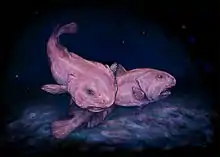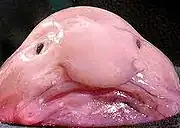Psychrolutes marcidus
Psychrolutes marcidus, the smooth-head blobfish,[1] also known simply as blobfish,[1] is a deep-sea fish of the family Psychrolutidae. It inhabits the deep waters off the coasts of mainland Australia and Tasmania, as well as the waters of New Zealand.[2]
| Psychrolutes marcidus | |
|---|---|
 | |
| Drawing of blobfish by Allan Riverstone McCulloch | |
| Scientific classification | |
| Domain: | Eukaryota |
| Kingdom: | Animalia |
| Phylum: | Chordata |
| Class: | Actinopterygii |
| Order: | Scorpaeniformes |
| Family: | Psychrolutidae |
| Genus: | Psychrolutes |
| Species: | P. marcidus |
| Binomial name | |
| Psychrolutes marcidus (McCulloch, 1926) | |
| Synonyms | |
|
Neophrynichthys marcidus McCulloch, 1926 | |
Blobfish are typically shorter than 30 cm (12 in). They live at depths between 600 and 1,200 m (2,000 and 3,900 ft), where the pressure is 60 to 120 times greater than that at sea level, which would likely make gas bladders inefficient for maintaining buoyancy.[2] Instead, the flesh of the blobfish is primarily a gelatinous mass with a density slightly less than that of water; this allows the fish to float above the sea floor without expending energy on swimming. The blobfish has a relative lack of muscle, but this is not a disadvantage, as its main food source is edible matter that floats in front of it, such as deep-ocean crustaceans.[3]
Blobfish are often caught as bycatch in bottom trawling nets. It was first discovered around the Norfolk and Lord Howe islands, which are located between Australia and New Zealand. The discovery was made by a team of two dozen scientists during their exploration of submarine habitats. The team towed gear on the ocean floor in order to net and study different species. Among the new species the caught was Psychrolutes marcidus.[4]
The popular impression of the blobfish as bulbous and gelatinous is partially an artifact of the decompression damage done to specimens when they are brought to the surface from the extreme depths in which they live.[5] In their natural environment, blobfish appear more typical for their superclass Osteichthyes (bony fish).
Gallery
 Artist's representation of two blobfish in situ
Artist's representation of two blobfish in situ Individual after suffering apparent decompression damage
Individual after suffering apparent decompression damage
References
- "Psychrolutes marcidus – Names". Atlas of Living Australia. Retrieved 2019-03-28.
- Froese, Rainer; Pauly, Daniel (eds.) (2010). "Psychrolutes marcidus" in FishBase. February 2010 version.
- Hearst, Michael (2012). Unusual Creatures: A Mostly Accurate Account of Some of Earth's Strangest Animals. Chronicle Books. pp. 24–25. ISBN 978-1-4521-0467-6.
- Lidz, F. (2015). Behold the Blobfish. Smithsonian, 46(7), 19–24.
- Taylor, Ian (4 April 2021). "The blobfish: a bloated guide to the world's ugliest animal". Science Focus. Retrieved 19 November 2021.